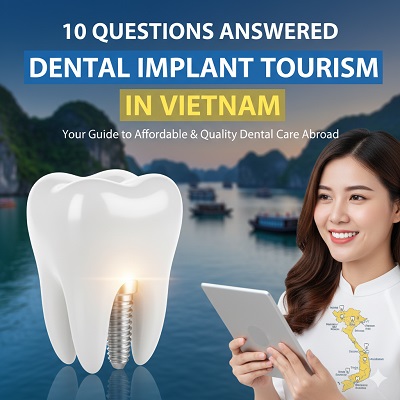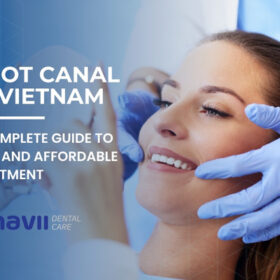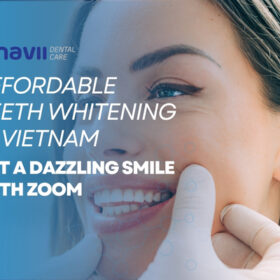Vietnam has rapidly become a top destination for dental tourism, especially for complex procedures like dental implants. With its winning combination of affordable costs, international-standard quality of care, and the chance to enjoy a vacation, a growing number of people from around the world are choosing Vietnam to restore their smiles.
Here are the answers to the 10 most common questions about getting dental implants in Vietnam, helping you make your decision with confidence.
1. Is it Really Cheaper to Get Dental Implants in Vietnam?
Yes, significantly cheaper. This is the number one reason driving dental tourism. The cost of a single dental implant in Vietnam can be 50-70% lower than in countries like Australia, the USA, or the UK. For example, the total cost for a complete implant (including the titanium post, abutment, and porcelain crown) in Vietnam typically ranges from $550 to $1,500 USD. The same procedure could easily cost $3,000 – $5,000 USD in the United States. For full-mouth restorations like All-on-4 or All-on-6, the savings are even more substantial.
2. Is the Quality of Dental Care Reliable in Vietnam?
Absolutely. Quality is a top priority. While low cost can sometimes raise concerns about quality, this is not the case for Vietnam’s reputable dental industry. Leading clinics in major cities like Hanoi and Ho Chi Minh City have invested heavily in state-of-the-art technology and equipment imported from G7 countries like Germany, the US, and Japan.
Dentists and surgeons are highly qualified, with many having received postgraduate training and international certifications abroad. They use world-leading implant systems from brands like Straumann (Switzerland) and Nobel Biocare (USA), ensuring safety, durability, and long-term success.
3. What is the Dental Implant Process Like?
The dental implant process in Vietnam strictly adheres to international medical standards and typically involves the following steps:
- Step 1: Consultation, Exam & 3D CT Scan: The dentist performs a comprehensive oral examination and uses a CT Cone Beam scan to assess your jawbone density and plan the precise placement of the implant.
- Step 2: Implant Placement Surgery: Under local anesthesia, the surgeon gently places the titanium implant post into your jawbone. This is a minor surgical procedure that usually takes only 15-20 minutes per implant.
- Step 3: Placement of a Temporary Crown (if needed): To maintain aesthetics and function while the implant heals, a temporary tooth may be placed.
- Step 4: Check-up and Suture Removal: You will return for a follow-up appointment about 7-10 days later for the dentist to check the healing and remove stitches.
- Step 5: Attaching the Final Crown: After the implant has fully integrated with the jawbone (a process called osseointegration, which takes 3-6 months), you will return for the final step. The dentist will take impressions and create a custom-made, permanent porcelain crown to be secured to the implant.
4. How Long Do I Need to Stay in Vietnam?
The duration of your stay depends on your treatment plan. Typically, the implant procedure is divided into two trips:
- Trip 1 (Implant Placement): You will need to stay for approximately 5-7 days for the initial surgery and follow-up check-up.
- Trip 2 (Final Crown Fitting): After the 3-6 month healing period, you will return to Vietnam for about 7-10 days to have your permanent crowns fitted.
Many clinics offer flexible scheduling to accommodate your travel plans.
5. Do the Dentists and Staff Speak English?
Yes. At reputable clinics that cater to international patients, the dentists, nurses, and patient coordinators are fluent in English. This ensures clear communication throughout the entire process, so you can fully understand your treatment and feel comfortable asking questions.
6. How Are Sterilization and Safety Guaranteed?
Top Vietnamese dental clinics place the highest importance on hygiene and safety. They follow strict sterilization protocols set by the Vietnamese Ministry of Health and international standards. Each patient is treated with a new set of sterilized instruments. Surgical rooms are maintained to hospital-grade sterility, often using UV light systems for air purification.
7. What Kind of Visa Do I Need to Visit Vietnam for Dental Work?
For most international visitors, a simple tourist visa (e-visa) is sufficient for dental treatment. The application process for Vietnam’s e-visa is straightforward and can be completed entirely online. It’s always a good idea to check the specific visa policies for your country of citizenship before you travel.
8. Can I Travel Around Vietnam After Getting an Implant?
Definitely. After your initial post-surgery check-up and once you feel comfortable, you are free to travel and explore the beautiful country. However, it’s recommended to rest and avoid strenuous activities for the first few days. You should also follow your dentist’s dietary and oral care instructions. Flying after implant surgery is perfectly safe.
9. What Happens If I Have an Issue After I Return Home?
Reputable clinics in Vietnam provide official, long-term warranties for their dental implant services. They will give you a warranty card and are available for remote consultations via phone or video call if any issues arise. They are committed to their patients’ long-term health and will work with you to find a solution.
10. Where is a Reputable Clinic for Dental Implants in Hanoi?
In Hanoi, Navii Dental Care is a trusted and highly recommended choice for both local and international patients seeking high-quality dental care.
With over 20 years of experience, Navii Dental Care stands out for several reasons:
- Prime Location: Conveniently located at 42 Cua Dong Street, Hoan Kiem District, it is in the heart of Hanoi’s historic Old Quarter, making it easy to access from hotels and tourist sites.
- Modern Technology: Navii is equipped with the latest dental technology, including 3D CT Cone Beam scanners for precise diagnostics and CAD/CAM systems for crafting perfect restorations.
- Highly Skilled Specialists: The dentists at Navii are highly experienced, have undergone specialized training, and are constantly updating their skills with the latest techniques in implantology.
- International Standards: The clinic operates with a strict adherence to international standards of hygiene, safety, and patient care.
- Professional, English-Speaking Service: The friendly staff is fluent in English and experienced in looking after the needs of international clients, ensuring a smooth and stress-free experience.
Choosing Vietnam for your dental implants is a smart decision that combines excellent, affordable dental care with the unforgettable experience of travel.


 VI
VI

